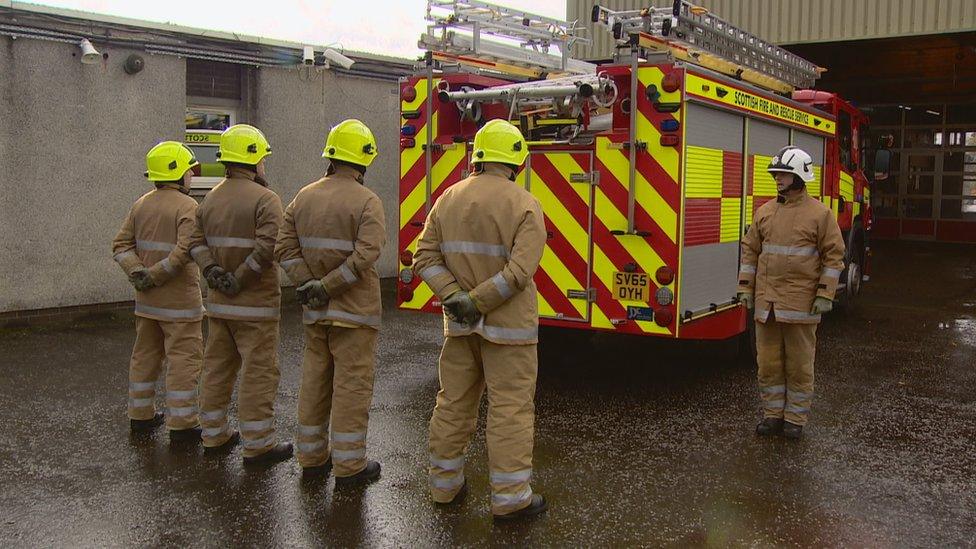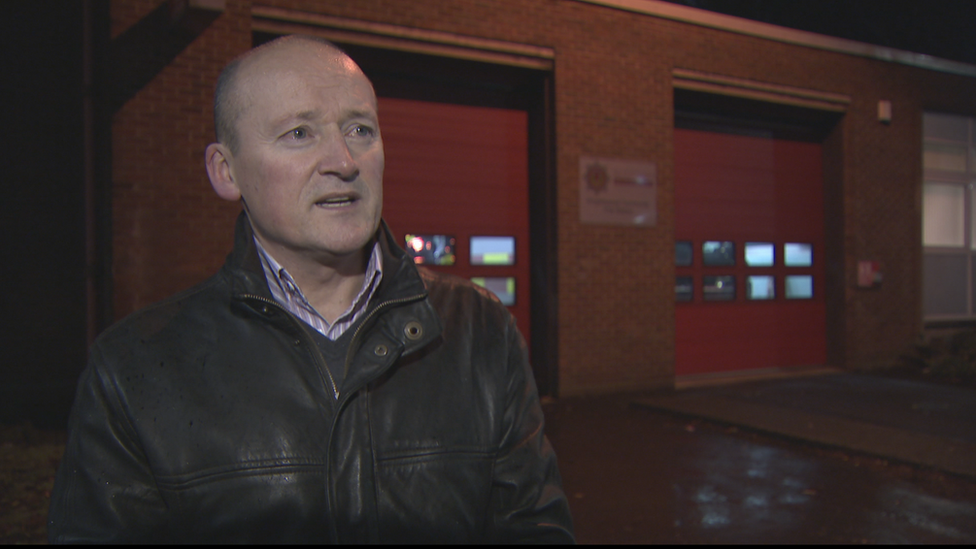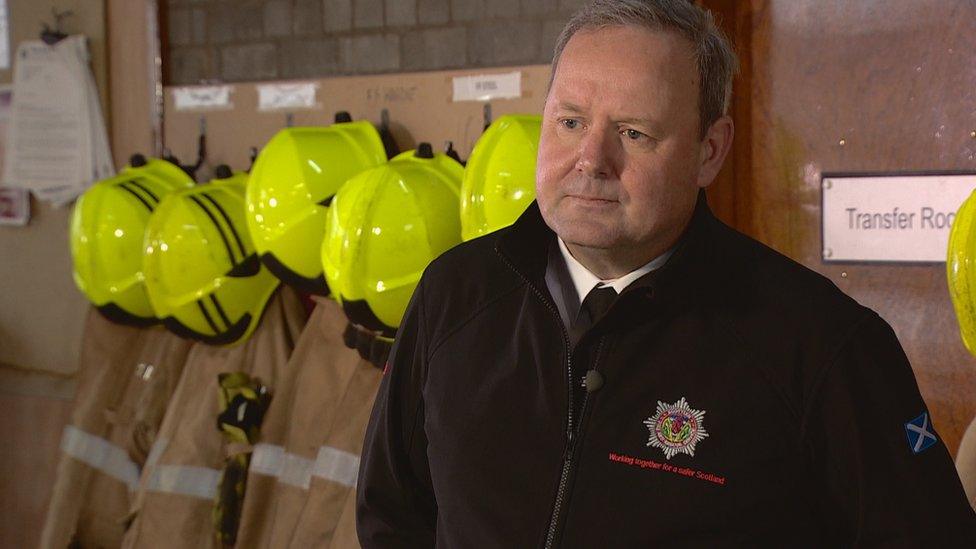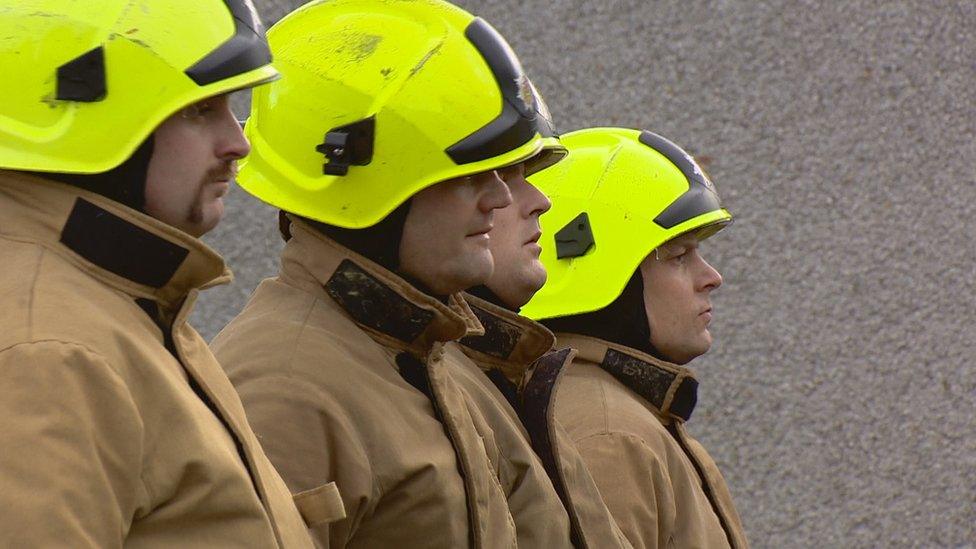FBU criticise fire service over pay deal offer
- Published

Firefighters have been offered a 20% pay rise for an expanded role
Scotland's fire service is facing criticism for writing directly to staff to offer them a pay rise of up to 20%.
The Fire Brigades Union (FBU) said it was "bitterly disappointed" that the Scottish Fire and Rescue Service (SFRS) had chosen to "bypass" the union.
Chief fire officer Alasdair Hay said the proposed pay deal was shared in the spirit of "openness and transparency" with staff.
The fire service was committed to collective bargaining, he added.
Firefighters have been offered the pay increase in return for taking on new responsibilities, including terrorism response and emergency medical care.
It is expected that between 200 and 300 jobs could be lost as part of the deal.
Officers have been told there will be no compulsory redundancies and the reduction in posts will be achieved through planned retirements.
In a letter to officers, Mr Hay and SFRS board chairwoman Kirsty Darwent outlined proposals to increase basic pay from £29,934 to £35,800 by 2021-22.
And they proposed that firefighters' roles would be expanded to include emergency medical care, terrorism response and wider engagement with the community.
However, Chris McGlone, the head of FBU Scotland, told BBC Radio Scotland that the fire service had "bypassed accepted and agreed protocols" by putting the offer directly to staff.

FBU Scotland head Chris McGlone has led criticism of the Scottish fire service
Speaking on the Good Morning Scotland programme, he said: "The Fire Brigades Union is bitterly disappointed that the service has chosen to write directly to our members with this offer - immediately following the delivery of this offer to ourselves, without giving us any opportunity or chance to even digest the offer."
He admitted that the pay rise appeared to be "significant", but he warned that the "devil is in the detail".
"There wasn't enough detail in the letters to our members," he said.
"I was over at Knightswood fire station last night, and at Govan fire station last night, and members - to be quite frank - are a bit confused, a bit bewildered and quite angered that the service has chosen to bypass their union."
'Difficult conversation'
He said there was no objection "in principle" to expanding the role of firefighters - and this was something the union had been discussing with the fire service for some time.
But he said the union would oppose any attempt to reduce officer numbers
The SFRS has lost 700 posts since Scotland's eight regional services were merged into a single service in 2013.
Asked if he would reject the pay increase if it was tied in with the job cuts, Mr McGlone said it would lead to a "very difficult conversation".
He added: "Any cuts in the service, any reduction in the number of firefighters - operational or otherwise, or control rooms - any reduction in the number of fire engines, any reduction in the number of stations, is always going to be a difficult conversation for us.
"We're perfectly willing to sit down and engage with the service on this offer, we're just extremely disappointed they have gone direct to our members."

Alasdair Hay said staff had the right know what proposals were being discussed
Fire chief Alasdair Hay told the John Beattie programme that the fire service wanted to share its proposals with staff in a "very open and honest way".
"It was never our intention to breach any negotiating, collective bargaining protocols, we would absolutely respect that," he said.
"We have sat down with the union, we will continue to do that. But equally our staff have a right to know what has been spoken about."
SFRS board chairwoman Kirsty Darwent added: "The letter to firefighters was a communication setting out a proposal.
"It was made very clear in that letter that the Scottish Fire and Rescue Service will only negotiate through agreed collective bargaining arrangements.
"We do not understand how the Fire Brigades Union can claim that we have circumvented those arrangements.
"We are putting the people of Scotland and our firefighters first, and we would ask the FBU to do the same at the negotiating table."

Fire service numbers

There were 7,834 staff employed by Scottish Fire and Rescue Service (SFRS) at 31 March 2017. This figure is 1% lower than in 2016
There are 700 fewer firefighters than 2013 when the fire service was merged
The number of fire stations in Scotland on 31 March 2017 was unchanged from 2016 at 356 stations
Two-thirds of all fire stations (240) are primarily RDS (retained duty system). These are mainly rural stations crewed by on-call, part-time fire officers
21% (74 stations) are full-time
12% (42 stations) are volunteer crewed

In response to an urgent question on the issue at Holyrood, Community Safety Minister Annabelle Ewing confirmed that the pay offer will undergo the collective bargaining process.
She said a formal consultation on the transformation of the fire service will be released in the next three weeks.
A Scottish government spokesman said progress had been made on implementing reform while protecting frontline services and that additional spending had been included in the draft budget for the fire service.
He added: "Operational decisions on the allocation of resources are a matter for the SFRS board and chief officer, who have been exploring for some time now how best to develop the service to meet new and emerging risks, including how transformation could see SFRS do more for the people of Scotland.
"The process involves liaison with staff, partners and the public.
"The SFRS has indicated that their proposed reward package would be for a new, expanded role for firefighters, which, of course, is still to be negotiated and agreed with unions."